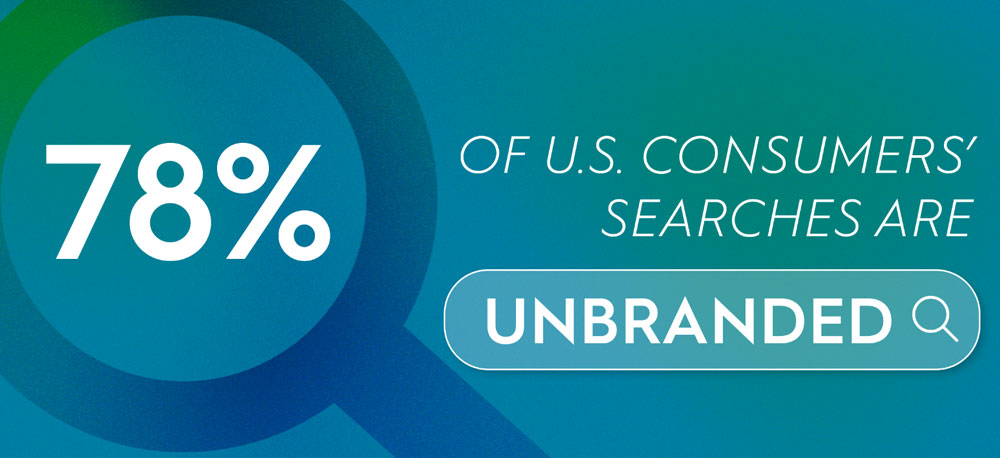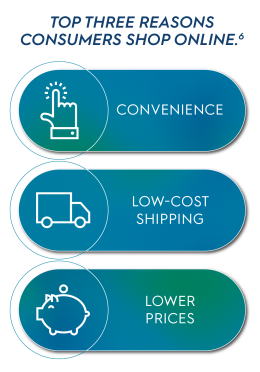Walmart is Dominating Amazon in Grocery Sales and is Poised for Continued Growth
Walmart is making significant strides in online sales and has…
We are based in historic Annapolis, Maryland, but our team is nationwide. Contact us today to learn how we can help amplify your brand.
Walmart is making significant strides in online sales and has…
Compass team leaders weigh in on what it means to…
More and more Americans are using generative AI tools in…

Brands need to meet consumers where they currently are to be successful, and that means brands must consider unbranded and high-volume category searches.
We are all shoppers, and we are all consumers. It’s inescapable. Even those of us who work with brands every day purchase products for ourselves and our families. Today, more and more of us are turning to online shopping to satisfy our wants and needs. Whether they’re shopping at pure play eCommerce retailers, direct-to-consumer websites, or omnichannel retailers, U.S. consumers are estimated to have spent more than $930 billion on eCommerce in 2021.1 Some retailers command more of the market than others: Amazon Marketplace—the third-party seller marketplace on Amazon—is estimated to have a market share of about 25% of total U.S. eCommerce.2
Unlike the curated product selection offered by brick-and-mortar retailers, eCommerce retailers offer a vast assortment of products. About 74% of U.S. consumers begin their online product searches on Amazon.com, and approximately 78% of their searches are “unbranded”.3, 4 The difference between branded and unbranded search is simple: if a search query does not include a brand name, it is unbranded. For example, “running shoes” is an unbranded search, while “Nike shoes” or “Adidas” are branded searches. Amazon and other eCommerce retailers determine what brands appear in unbranded search results. As a result, having a search strategy, employing search engine optimization (SEO) tactics, and optimizing online product content is critical to success.
From the data, it’s clear most consumers are searching for products using general or generic keywords. Although consumers are starting their online buying journey looking for particular types of products, they are often not immediately looking for specific brands. In fact, globally, consumers cite convenience—both the constant availability of eCommerce and the fact that shopping can be accomplished without going to a store—and price as leading reasons they choose to shop online.5 Research among U.S. consumers found similar results. In the last quarter of 2021, a survey of 1,000 U.S. consumers found lower prices, low-cost shipping, and convenience are the top three reasons they shop online.6 Among these consumers, the desire or ability to “Search for [a] certain brand” was ranked as the ninth most popular reason they shop online.6 Furthermore, according to Amazon search habit research, the tendency among consumers to choose unbranded over branded search terms may be because consumers are turning to Amazon to fulfill or satisfy whatever need they have at that time.7

Regardless of the reason behind the unbranded search, brands need to meet consumers where they currently are to be successful. This means considering unbranded and high-volume category searches when creating their keyword strategy. Ideally, a strong keyword strategy should understand the roles branded and unbranded keywords play and strike a balance. Unbranded search is great for capturing new-to-brand consumers and is an essential tool for new and emerging brands. eCommerce retailers, like Amazon, are more than just a sales channel, they’re marketing channels too. Since, as previously mentioned, nearly three-quarters of U.S. consumers start online product searches at Amazon, ensuring product content includes both high-ranking branded and unbranded search terms can help put consumers on the path to purchase.3
To win unbranded search, it is critical to identify the right keywords. Keyword planner tools can help simplify this process while uncovering critical insights. At Compass Marketing, we use our Compass Digital Analytics Platform (CDAP) to identify keywords or search terms based not only on relevancy, but also by search volume. Incorporating relevant and frequently searched keywords into high-quality product content is a key part of a successful unbranded search strategy and can help increase a product’s organic listing rank. Research shows that Amazon consumers prefer organic listings, finding them more appealing than sponsored ads.6 Although that research focused on Amazon, since many eCommerce retailers offer similar advertising products, these general results may be extrapolated to other retailers. More broadly, boosting organic search rank through a strong keyword strategy can help increase brand visibility, clicks, and convert consumers.
Despite this blog’s focus on unbranded search, brands should not underestimate or neglect branded search, since it still accounts for a significant amount of search traffic. About 74% of the top 10,000 and about 68% of the top 1,000 search terms in the U.S. were branded.5 Furthermore, about 75% of consumers and 59% of frequent Amazon shoppers said a brand name is important to them when choosing a product.5 Employing an effective search and keyword strategy that balances branded and unbranded search helps brands make the most efficient and effective use of their advertising budget. As online shopping continues to increase, and as omnichannel shopping becomes important for brands large, small, and every size in between, Compass Marketing can help brands position themselves to win today and into the future.
SOURCES:

Aaron is currently in a leadership role at Compass Marketing. He has 25 years of experience in operational and growth-oriented consulting in large and small consulting firms.

Zach is an eCommerce Strategist with extensive experience growing and transforming brands through eCommerce.

Nick is a copywriter at Compass Marketing with extensive experience crafting effective, sales-focused copy for a variety of CPG brands.

Keeley is a graphic designer at Compass Marketing. She helps brands tell their stories through persuasive and engaging design.
Compass Marketing can help you discover opportunities for your brand. Our account managers and eCommerce experts use a holistic approach based on data and insights to help guide brands to success. If you would like to learn more, please reach out to info@compassmarketinginc.net! We are always happy to help and would love to learn more about you and your brand.
We are dedicated to making brands more valuable by combining the very best in insights and experiences with unmatched human interaction. Our team of sales, marketing, and digital experts is dedicated to growing our clients’ market share and building brand equity. We combine art and science—pairing the personal expertise of our team with proprietary technology—to help brands grow quickly and efficiently. As an Amazon Ads partner, we can help brands realize significant growth on one of the world’s largest eCommerce retailers.
Click here and subscribe to communications and receive invitations to our impactful webinars with our industry-leading partners.
We are based in historic Annapolis, Maryland, but our team is nationwide. Contact us today to learn how we can help amplify your brand.
©Compass Marketing Inc. All rights reserved.